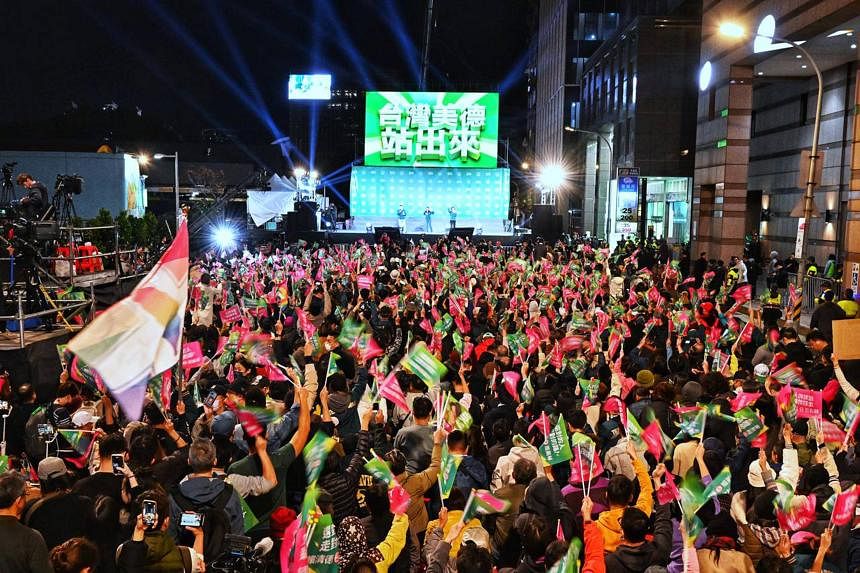TAIPEI - Taiwan has told China to “face reality” and respect its election outcome, in a riposte to Beijing after the latter sought to use the independence-leaning Democratic Progressive Party’s (DPP) thin victory margin against it while reiterating that “Taiwan is China’s Taiwan”.
As the dust settles after Polling Day, the island is also grappling with the changes that the results herald: a new era in domestic politics with the rise of a third force – neither the DPP nor the Kuomintang (KMT) – driven largely by angry young voters.
“Young people were very crucial in this election, and they have sent a clear message that they are disappointed and want change,” said Associate Professor Chen Min-chi, an East Asian studies expert from Taiwan’s National Tsing-hua University.
Some 14 million Taiwanese voted on Jan 13, and Mr Lai Ching-te won – but with just around 40 per cent of the vote, making him only the second leader in Taiwanese history to garner less than a majority of the presidential vote since the DPP’s Mr Chen Shui-bian won 39.3 per cent in 2000.
Post-election, Beijing said the results show that the DPP cannot represent the mainstream sentiments of voters on the island. It added that the election “will not impede the inevitable trend of China’s reunification”, and that “Taiwan is China’s Taiwan”.
In response, Taiwan’s foreign ministry told Beijing to accept the election outcome.
“The Ministry of Foreign Affairs calls on the Beijing authorities to respect the election results, face reality and give up suppressing Taiwan in order for positive cross-strait interactions to return to the right track,” it said.
With the 2024 polls, Taiwan’s electoral landscape has undergone a shift from its traditional blue-green hues, representing the KMT and DPP camps, respectively.
KMT’s Mr Hou Yu-ih received around 33 per cent of ballots cast, a slight dip from the KMT’s vote share at the last presidential election in 2020.
Dr Ko Wen-je of the Taiwan People’s Party (TPP), however, secured about 26 per cent of the vote, considered a remarkable achievement for a first-time bid and a party formed only in 2019.
It also looks set to be a kingmaker in the legislature, where, with eight seats, it could ultimately hold the balance of power in the 113-seat legislature. The KMT won 52 legislative seats, while the DPP, which lost its majority, took 51. Two went to independents.
Young voters were key to the outcome, said observers. While cross-strait relations loomed over the vote, many were more seized by bread-and-butter issues such as housing affordability, inflation and income inequality, and how the incumbent DPP has handled them. There was also disenfranchisement over Taiwan’s entrenched political duopoly.
For Taiwanese manicurist Selena Lu, the TPP’s outsized role hopefully spells more accountability among the larger and more established parties.
The 29-year-old, who voted for Dr Ko and his party “without any hesitation”, told The Straits Times: “My impression of Ko is that he’s someone who can get things done. The other two parties are just fighting all the time.”
She added that the ruling party had not done enough to slow down soaring housing prices. “I feel sad every time I walk by realtor offices.
“The sales figures on the ads in the windows are just impossible to reach,” she said.
In the lead-up to the vote, opinion polls had consistently indicated that Dr Ko resonated with young people. In a Dec 27 survey by Taiwanese broadcaster MNews, for instance, 51 per cent of those aged 20 to 24 said they supported Dr Ko, versus 25.7 per cent for Mr Lai and 10.2 per cent for Mr Hou.
Throughout the campaign period, Dr Ko’s rallies also saw mostly young people in the crowds. Thousands of his supporters, known as “little grass” in a nod to how new the party is, would show up at events wearing clips of plastic grass in their hair.
Convenience store worker Lin Hsiang-hung, 25, said that he and his peers wanted a more pluralistic political landscape.
His family are long-time supporters of the KMT, but he said he could not vote the same way because the party was “stuck in its old ways”.
“After all this time, the KMT is still going on about the 1992 Consensus,” he said, referring to a tacit agreement between Beijing and the then ruling KMT that the two sides of the strait are part of one China.
“I voted for the TPP because Ko hasn’t really focused on the China issue. He has focused more on issues like social housing, which is more important to me.”
At a dinner event on Jan 14, Mr Lai acknowledged the DPP’s loss of its legislative majority, and pledged not to give up. “The greater the challenges, the harder you have to work,” he said.
Meanwhile, political jockeying will soon start.
“Everyone will be watching who the TPP chooses to work with, going forward. Both the DPP and the KMT will need Ko on their side to advance their agenda,” said Associate Professor Chen Shih-min from National Taiwan University.
After the election, Dr Ko told reporters that he has no plans to work with a fixed party.
“I’ll choose to work with whichever party, depending on the issues at hand,” he said.


